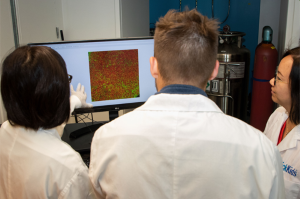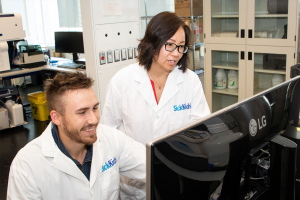Deep single-cell analysis at SickKids facility lowers barriers to multi-omics research
Summary:
The Centre for Advanced Single Cell Analysis provides researchers with access to technical platforms and scientific expertise to perform high content single cell analyses of blood or tissue samples.

The Centre for Advanced Single Cell Analysis (CASCA) at The Hospital for Sick Children (SickKids) is using specialized instruments to conduct detailed analyses of individual cells and inform a range of research areas including immunology, cancer biology and infectious disease.
When scientists are exploring a new avenue for research, or trying to decipher a therapy’s potential, maximizing the amount of gatherable information from a single cell is essential to uncovering the next steps in their research.
With suspension mass cytometry, CASCA can interrogate a single cell with 40 to 50 metal-tagged antibody markers at the same time. Because each metal has a unique isotope – a different number of protons and neutrons – none of the tags overlap during analysis and scientists can measure the number of marker(s) expressed by each cell. Together with imaging mass cytometry, which allows scientists to visually examine cells within their surrounding environment, including in archival tissue specimens, CASCA supports deep, single-cell profiling that can bring new insights to past and current research.
“Mass cytometry combines the power of mass spectrometry and flow cytometry to maximize information output when working with cells from precious and limited specimens,” explains Tina Chen, CASCA Service Manager. “Such ‘high content’ analyses can speed up discovery and provide more detailed cellular visualizations that may uncover novel cell characteristics and potential therapeutic targets.”
Maximizing the research potential of a single cell
Using a single-cell “multi-omics” platform, CASCA can also tag the proteins and transcripts of individual cells for deep sequencing by The Centre for Applied Genomics (TCAG) at SickKids. Multi-omics approaches are widely used in immunology and rheumatology, cancer biology, neuroscience and other fields to define differences among individual cells within cell mixtures.

Dr. Cynthia Guidos, CASCA’s Scientific Director and Senior Scientist in the Cell Biology program, recently used this platform alongside SickKids scientists to discover how an immune gene variation found in children disrupts immune function in a pre-clinical model, published in Frontiers in Immunology.
“The innovative single cell technologies at CASCA support unprecedented opportunities to accelerate discovery for fundamental research projects and enables scientists to embark on Precision Child Health projects, using patient cohorts to identify biomarkers of condition subtype, progression or effective responses to therapies,” says Guidos, who is also Scientific Director of the SickKids-UHN Flow Cytometry core facility.
Advancing research through specialized support
Services at CASCA are run by highly trained technical staff, meaning researchers do not need to run the instruments on their own. This lowers the barrier of entry for scientists both in required technical expertise and costs.

“Our support helps save research time,” Chen says. “It would take months for a researcher to get and validate reagents, plus the upfront preparation work is difficult. We help troubleshoot so researchers can overcome the specific aspect of their project to carry them through and be more efficient with better outputs.”
For scientists interested in proof of concept, single cells can also be provided to the CASCA facility for staff to complete mass cytometry immune profiling pilot experiments. Researchers can purchase this service as a one-time use of the facility.
“An initial screen helps scientists understand if there is anything worth delving deeper into,” Chen explains. “It’s a big investment to start a project. By providing a pilot study, our facility helps minimize the initial input and allows researchers to focus on projects with the biggest potential impact for patients.”
As the technology continues to develop, CASCA is constantly looking to upgrade the specificity and complexity of their instruments and to continue to increase the number of parameters that they can analyze.
Need help with your research? Get in touch with CASCA
The SickKids CASCA core facility provides researchers with access to state-of-the-art mass cytometers, single cell multi-omics and multiplexed tissue immunohistology services. The facility is available to all members of the research community on a fee-for-service basis.

